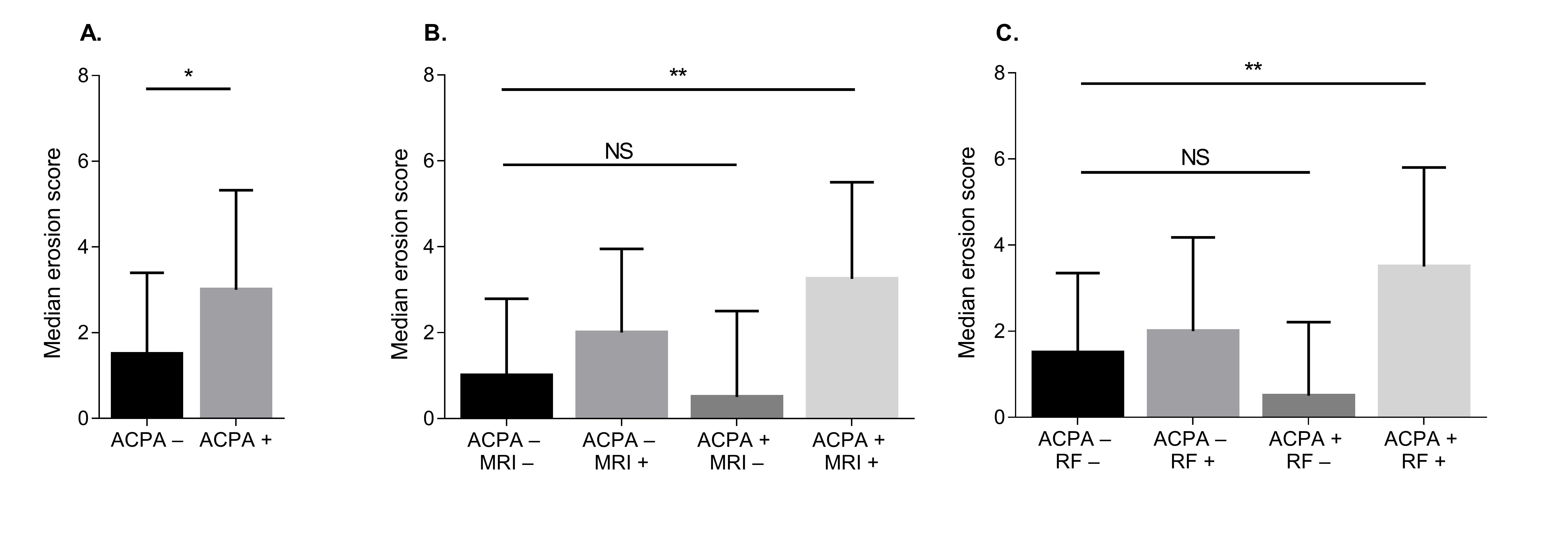Session Information
Date: Sunday, November 5, 2017
Title: Rheumatoid Arthritis – Human Etiology and Pathogenesis Poster I
Session Type: ACR Poster Session A
Session Time: 9:00AM-11:00AM
Background/Purpose:
Anti-citrullinated protein antibodies (ACPA) associate with more severe joint erosions in rheumatoid arthritis (RA), but the underlying mechanism is unclear. Recent in vitro and murine studies indicate that ACPAs can directly activate osteoclasts leading to bone erosion and pain. This study sought evidence for this hypothesis on the human level and evaluated in arthralgia patients at risk for RA whether ACPA associated with erosions (detected by MRI) independent of inflammation, and also independent of the presence of other autoantibodies (Rheumatoid Factor, RF).
Methods:
225 patients with Clinically Suspect Arthralgia underwent ACPA- and RF-determination and 1.5T contrast-enhanced MRI of metacarpophalangeal, wrist and metatarsophalangeal joints at baseline. MRIs were scored for presence of local inflammation and erosions.
Results:
ACPA-positive patients had higher erosion-scores than ACPA-negative patients (p=0.02; Figure Panel A). ACPA-positive patients without subclinical inflammation did not have higher erosion-scores than ACPA-negative patients (p=0.45), in contrast to ACPA-positive patients with local inflammation (p=0.001, Figure Panel B). Mediation analyses suggested that local inflammation is in the causal path of ACPA leading to higher erosion-scores. Compared to autoantibody-negative patients, ACPA-positive/RF-negative patients did not differ (p=0.41), but ACPA-positive/RF-positive patients had higher erosion-scores (p=0.001 Figure Panel C).
Conclusion:
The effect of ACPA on erosions is mediated by inflammation and is not independent of RF.
Legend:
Histograms showing median erosion-scores with standard deviations.
* indicates significance at p<0.05 level, ** indicates significance of p<0.01 level, NS indicates non-significance
To cite this abstract in AMA style:
ten Brinck RM, Toes R, van der Helm-van Mil AHM. The Link between ACPA and Erosion Development: Is ACPA Sufficient? an Association Study in Clinically Suspect Arthralgia [abstract]. Arthritis Rheumatol. 2017; 69 (suppl 10). https://acrabstracts.org/abstract/the-link-between-acpa-and-erosion-development-is-acpa-sufficient-an-association-study-in-clinically-suspect-arthralgia/. Accessed .« Back to 2017 ACR/ARHP Annual Meeting
ACR Meeting Abstracts - https://acrabstracts.org/abstract/the-link-between-acpa-and-erosion-development-is-acpa-sufficient-an-association-study-in-clinically-suspect-arthralgia/

